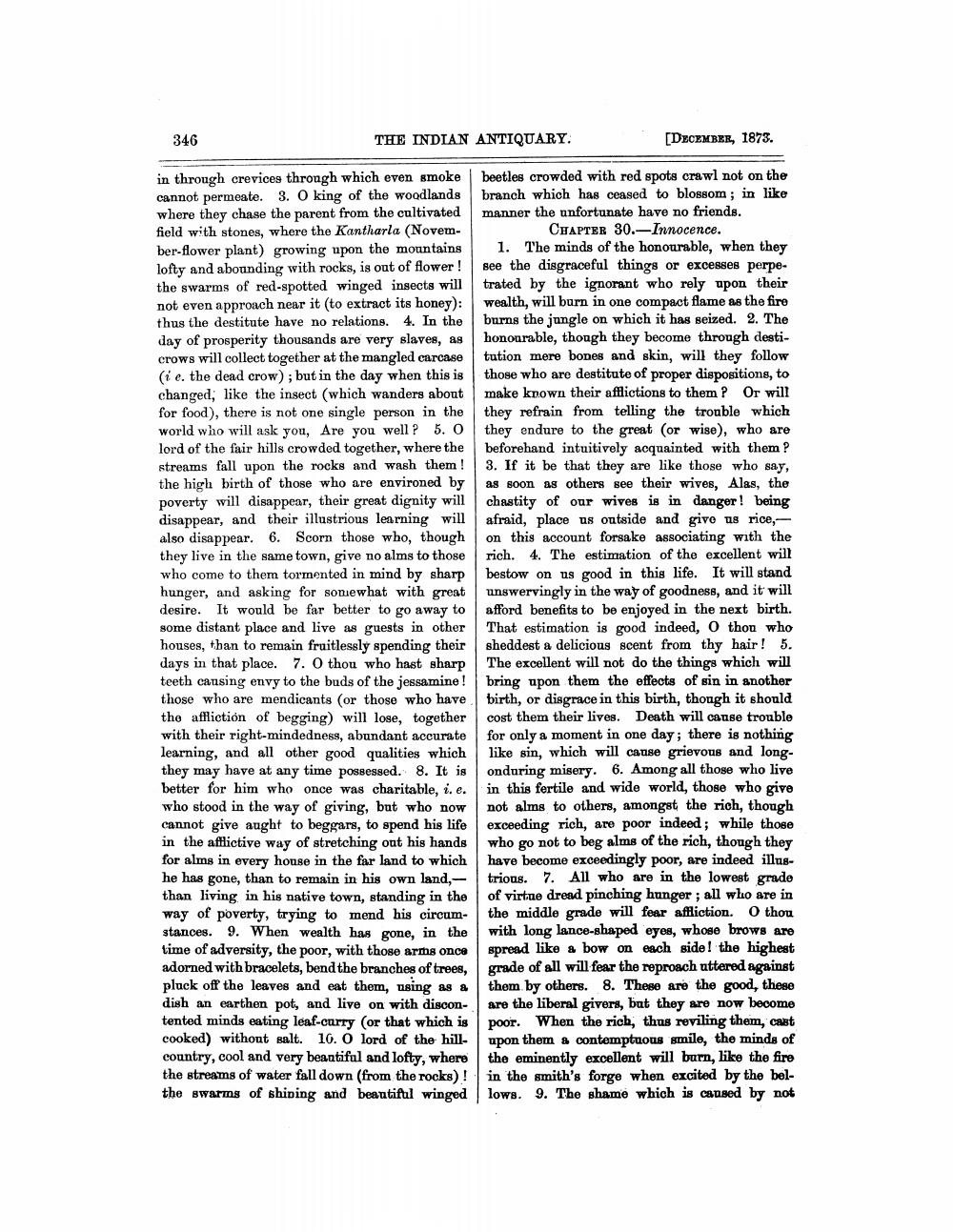________________
346
THE INDIAN ANTIQUARY.
[DECEMBER, 1873.
beetles crowded with red spots crawl not on the branch which has ceased to blossom; in like manner the unfortunate have no friends. CHAPTER 30.-Innocence.
1. The minds of the honourable, when they see the disgraceful things or excesses perpetrated by the ignorant who rely upon their wealth, will burn in one compact flame as the fire burns the jungle on which it has seized. 2. The honourable, though they become through destitution mere bones and skin, will they follow those who are destitute of proper dispositions, to make known their afflictions to them? Or will they refrain from telling the trouble which they endure to the great (or wise), who are beforehand intuitively acquainted with them? 3. If it be that they are like those who say, as soon as others see their wives, Alas, the chastity of our wives is in danger! being afraid, place us outside and give us rice,on this account forsake associating with the rich. 4. The estimation of the excellent will bestow on us good in this life. It will stand unswervingly in the way of goodness, and it will afford benefits to be enjoyed in the next birth. That estimation is good indeed, O thou who sheddest a delicious scent from thy hair! 5. The excellent will not do the things which will bring upon them the effects of sin in another birth, or disgrace in this birth, though it should cost them their lives. Death will cause trouble for only a moment in one day; there is nothing like sin, which will cause grievous and longonduring misery. 6. Among all those who live in this fertile and wide world, those who give not alms to others, amongst the rich, though exceeding rich, are poor indeed; while those who go not to beg alms of the rich, though they have become exceedingly poor, are indeed illustrious. 7. All who are in the lowest grade of virtue dread pinching hunger; all who are in the middle grade will fear affliction. O thou with long lance-shaped eyes, whose brows are spread like a bow on each side! the highest grade of all will fear the reproach uttered against them by others. 8. These are the good, these are the liberal givers, but they are now become poor. When the rich, thus reviling them, cast upon them a contemptuous smile, the minds of the eminently excellent will burn, like the fire in the smith's forge when excited by the bellows. 9. The shame which is caused by not
in through crevices through which even smoke cannot permeate. 3. O king of the woodlands where they chase the parent from the cultivated field with stones, where the Kantharla (November-flower plant) growing upon the mountains lofty and abounding with rocks, is out of flower! the swarms of red-spotted winged insects will not even approach near it (to extract its honey): thus the destitute have no relations. 4. In the day of prosperity thousands are very slaves, as crows will collect together at the mangled carcase (ie. the dead crow); but in the day when this is changed, like the insect (which wanders about for food), there is not one single person in the world who will ask you, Are you well? 5. O lord of the fair hills crowded together, where the streams fall upon the rocks and wash them! the high birth of those who are environed by poverty will disappear, their great dignity will disappear, and their illustrious learning will also disappear. 6. Scorn those who, though they live in the same town, give no alms to those who come to them tormented in mind by sharp hunger, and asking for somewhat with great desire. It would be far better to go away to some distant place and live as guests in other houses, than to remain fruitlessly spending their days in that place. 7. O thou who hast sharp teeth causing envy to the buds of the jessamine! those who are mendicants (or those who have the affliction of begging) will lose, together with their right-mindedness, abundant accurate learning, and all other good qualities which they may have at any time possessed. 8. It is better for him who once was charitable, i. e. who stood in the way of giving, but who now cannot give aught to beggars, to spend his life in the afflictive way of stretching out his hands for alms in every house in the far land to which he has gone, than to remain in his own land, than living in his native town, standing in the way of poverty, trying to mend his circumstances. 9. When wealth has gone, in the time of adversity, the poor, with those arms once adorned with bracelets, bend the branches of trees, pluck off the leaves and eat them, using as a dish an earthen pot, and live on with discontented minds eating leaf-curry (or that which is cooked) without salt. 10. O lord of the hillcountry, cool and very beautiful and lofty, where the streams of water fall down (from the rocks)! the swarms of shining and beautiful winged




